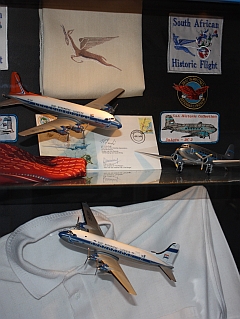SAA Museum Society, Rand Airport
The South African Airways Museum Society, currently based
at Rand Airport in Johannesburg, was founded in 1986 and aims to preserve
the history of South African Airways and that of general civil aviation
in South Africa. The static displays are located in an new area next
to the Transvaal Aviation Club that was allocated to the SAA Museum Society
by the management of Rand Airport in August 2006.
Prior to the formation of the
SAA Museum Society, South African Airways had acquired various historic
aircraft that were earmarked for preservation. The collection comprised
of some pristine airworthy aircraft that were part of the SAA Historic
Flight, some that were restored to static display condition and still others
that were somewhat neglected and are waiting for much needed funds for their
restoration.
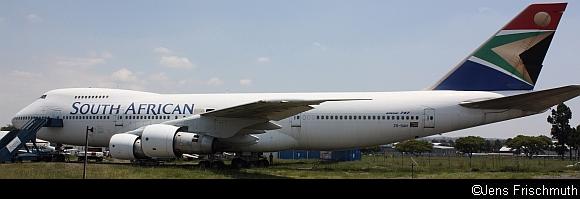
For a long time, the historic planes were (and a
few still are) kept at the SAA facilities at the then Jan
Smuts Airport (now called the OR Tambo International Airport). From
1999 to 2006, they found a new home at Air Force Base Swartkop, when SAA
briefly severed its links with the Historic Flight and the collection was
taken over by the Transnet Heritage Foundation. When AFB Swartkop was
reactivated, the planes moved back to Johannesburg International
Airport in 2005 for a short while before finding a new home at
Rand Airport in September 2006. The entire collection was donated to
the SAA Museum Society in December 2007.
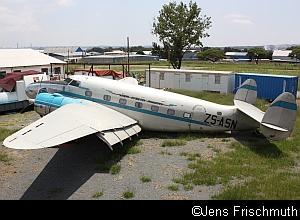 The first acquisition was in
December 1973 and consisted of the Lockheed L18-08 Lodestar "Andries Pretorius", registration ZS-ASN.
The Lodestars were operated by SAA between 1939 and 1955. This particular
plane was found neglected at Grand Central Airport in 1972 and the owners at
the time were persuaded to donate the aircraft for eventual display at the
museum. It was moved to SAA at the then Jan Smuts Airport in December 1973
and restored. The refurbished plane made its public display at an SAA Open
Day in October 1975. It is the oldest ex-SAA aircraft in existence in South
Africa.
The first acquisition was in
December 1973 and consisted of the Lockheed L18-08 Lodestar "Andries Pretorius", registration ZS-ASN.
The Lodestars were operated by SAA between 1939 and 1955. This particular
plane was found neglected at Grand Central Airport in 1972 and the owners at
the time were persuaded to donate the aircraft for eventual display at the
museum. It was moved to SAA at the then Jan Smuts Airport in December 1973
and restored. The refurbished plane made its public display at an SAA Open
Day in October 1975. It is the oldest ex-SAA aircraft in existence in South
Africa.
 The De Havilland DH104 Dove "Katberg" (ZS-BCC), one of two operated by
SAA between 1947 and 1952, was acquired in February 1979. This plane had
found its way to the UK and was kept for spares at White Waltham Airport near London
when it was "rediscovered" in 1972. Generous donations by Hawker
Siddeley, Goodyear and Dunlop enabled it to be freighted
back to South Africa in 1979 to become part of the Museum's permanent static
displays.
The De Havilland DH104 Dove "Katberg" (ZS-BCC), one of two operated by
SAA between 1947 and 1952, was acquired in February 1979. This plane had
found its way to the UK and was kept for spares at White Waltham Airport near London
when it was "rediscovered" in 1972. Generous donations by Hawker
Siddeley, Goodyear and Dunlop enabled it to be freighted
back to South Africa in 1979 to become part of the Museum's permanent static
displays.
A Lockheed L1649A
Starliner (ZS-DVJ) was acquired in May 1979. It once formed part of the fleet
of Trek Airways. After finishing its flying career, it served a stint as
a road-side restaurant near Warmbaths, before being shipped to Jan
Smuts Airport in 1973. It was restored extensively in 1987/88. It is
presently stored at the SAA Technical Facilities at OR Tambo International Airport.
There are plans to move it by road to Rand Airport in future.
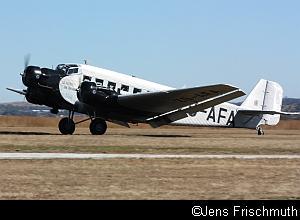 The Junkers Ju52/3m "Jan van Riebeeck" (ZS-AFA)
was acquired in May 1981. As part of the 50th Anniversary celebrations of
South African Airways, SAA thought to acquire an example of its first
true airliner, the Ju52/3m, of which SAA operated 15 from November 1934 up
to the outbreak of World War II. As there were no originals that were
suitable for restoration to airworthy status, they had to settle for a CASA
252L, a version of the Ju52/3m built under licence in Spain. This
particular plane was acquired from Warbirds of Great Britain on 12 May 1981, from
where it was flown to Bremen, disassembled and shipped to Jan Smuts
Airport via Durban Harbour. Restoration work began in earnest in late 1982 and
the plane took to the skies again in 1984 after an extensive rebuild. On
1 February 1984 (the 50th anniversary of SAA), it took off from Jan Smuts
Airport and arrived on schedule overhead Rand Airport to the delight of
the expectant crowd. The plane was later certified to carry passengers and soon became
a familiar sight over Johannesburg. The plane was withdrawn from service in
2000 due to the lack of availability of replacement tires. To solve this
problem, the undercarriage was swapped with a later type undercarriage
from a Junkers Ju52 museum specimen housed at the RAF Museum at Duxford in
the UK. This later type undercarriage used more readily available and
robust DC-3 type tires. With the new undercarriage, the plane took to the
skies again on the 30th of November 2005.
The Junkers Ju52/3m "Jan van Riebeeck" (ZS-AFA)
was acquired in May 1981. As part of the 50th Anniversary celebrations of
South African Airways, SAA thought to acquire an example of its first
true airliner, the Ju52/3m, of which SAA operated 15 from November 1934 up
to the outbreak of World War II. As there were no originals that were
suitable for restoration to airworthy status, they had to settle for a CASA
252L, a version of the Ju52/3m built under licence in Spain. This
particular plane was acquired from Warbirds of Great Britain on 12 May 1981, from
where it was flown to Bremen, disassembled and shipped to Jan Smuts
Airport via Durban Harbour. Restoration work began in earnest in late 1982 and
the plane took to the skies again in 1984 after an extensive rebuild. On
1 February 1984 (the 50th anniversary of SAA), it took off from Jan Smuts
Airport and arrived on schedule overhead Rand Airport to the delight of
the expectant crowd. The plane was later certified to carry passengers and soon became
a familiar sight over Johannesburg. The plane was withdrawn from service in
2000 due to the lack of availability of replacement tires. To solve this
problem, the undercarriage was swapped with a later type undercarriage
from a Junkers Ju52 museum specimen housed at the RAF Museum at Duxford in
the UK. This later type undercarriage used more readily available and
robust DC-3 type tires. With the new undercarriage, the plane took to the
skies again on the 30th of November 2005.
The next acquisition, a Vickers VC1A Viking, ZS-DKH, was
received in March 1987 and was the first plane acquired by the newly founded
SAA Museum Society. It once belonged to Trek Airways and was a landmark atop
Vic de Villier's Service Station in Armandale, south a Johannesburg, for a
time. It was donated to the Museum Society in 1987 and shipped to Jan Smuts
Airport that year. Unfortunately, 20 plus years later, the plane has not
been restored and is a tatty hulk standing not too far from the run-up
area at OR Tambo International Airport.
The SAA
Historic Flight was established in November 1993 to ensure the continued
commercial viability of SAA's vintage aircraft fleet. Initially
established to formalise the operation of the Ju52, a DC-3 and two DC-4s
were soon added to the flight.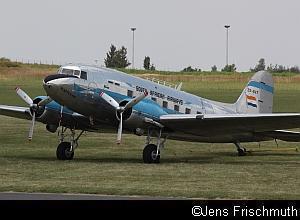 The Douglas DC-3 Dakota "Klapperkop"
(ZS-BXF) was acquired by the Historic Flight in February 1991 and its
first flight after restoration was on the 16th November 1993. This Dakota served
with SAA for nearly a quarter of a century and this particular aircraft was
in service with SAA from August 1948 to February 1971. It was
then disposed off to the South African Air Force, before being returned to SAA
20 years later. It is painted to represent the DC-3s that began service with
SAA during the 1940s.
The Douglas DC-3 Dakota "Klapperkop"
(ZS-BXF) was acquired by the Historic Flight in February 1991 and its
first flight after restoration was on the 16th November 1993. This Dakota served
with SAA for nearly a quarter of a century and this particular aircraft was
in service with SAA from August 1948 to February 1971. It was
then disposed off to the South African Air Force, before being returned to SAA
20 years later. It is painted to represent the DC-3s that began service with
SAA during the 1940s. 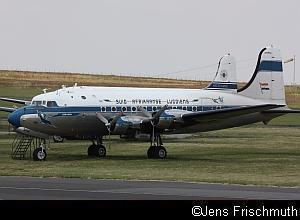 The Douglas
DC-4 Skymaster "Lebombo" (ZS-BMH)
was received from the SAAF in 1992 and entered service with
the Historic Flight in April 1993 after an extensive rebuild. This aircraft was
initially delivered to SAA on 18 August 1947 and was the last DC-4 Skymaster
ever off the Douglas production line. It was operated by SAA until January
1966, when it was sold to the SAAF to be operated by 44 Squadron.
The Douglas
DC-4 Skymaster "Lebombo" (ZS-BMH)
was received from the SAAF in 1992 and entered service with
the Historic Flight in April 1993 after an extensive rebuild. This aircraft was
initially delivered to SAA on 18 August 1947 and was the last DC-4 Skymaster
ever off the Douglas production line. It was operated by SAA until January
1966, when it was sold to the SAAF to be operated by 44 Squadron.
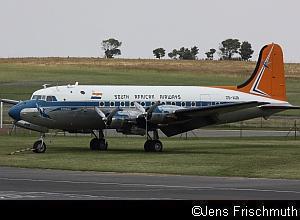 The Douglas DC-4 Skymaster "Outeniqua" (ZS-AUB) was first delivered to SAA
in May 1946 and was the last DC-4 to be sold to the SAAF on 29 September
1967. In December 1995, it was delivered to the Historic Flight from AFB
Waterkloof to Jan Smuts Airport, still in SAAF colours. The Skymasters
are two of very few passenger-licensed Douglas DC-4s operating in the
world today.
The Douglas DC-4 Skymaster "Outeniqua" (ZS-AUB) was first delivered to SAA
in May 1946 and was the last DC-4 to be sold to the SAAF on 29 September
1967. In December 1995, it was delivered to the Historic Flight from AFB
Waterkloof to Jan Smuts Airport, still in SAAF colours. The Skymasters
are two of very few passenger-licensed Douglas DC-4s operating in the
world today.
The DC-3 and the DC-4s
are currently leased to the Rand Airport based charter operator
Skyclass Aviation who specialise in African Flying Safaris to Southern
Africa.
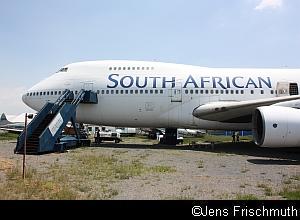 In
March 2002, the SAAMS approached SAA with the request
to donate a soon to be retired Boeing 747. SAA agreed and appropriately earmarked
the B747-224B "Lebombo" (ZS-SAN) for preservation. Lebombo was the first
Jumbo Jet to be seen in South Africa when she arrived on 6
November 1971. In her service life spanning 31 years, 11 months and 14 days,
this plane flew a total of 107689 hours and completed 20304 landings (this equates
to spending over 12 years in the air). On her final flight,
the plane was delivered to Rand Airport by Captains Dennis Spence and Stuart Lithgow
on 5 March 2004, when she performed a textbook landing on runway 11. This
acquisition has been described as "possibly the most pro- active event in
preserving civil aviation history in South Africa".
In
March 2002, the SAAMS approached SAA with the request
to donate a soon to be retired Boeing 747. SAA agreed and appropriately earmarked
the B747-224B "Lebombo" (ZS-SAN) for preservation. Lebombo was the first
Jumbo Jet to be seen in South Africa when she arrived on 6
November 1971. In her service life spanning 31 years, 11 months and 14 days,
this plane flew a total of 107689 hours and completed 20304 landings (this equates
to spending over 12 years in the air). On her final flight,
the plane was delivered to Rand Airport by Captains Dennis Spence and Stuart Lithgow
on 5 March 2004, when she performed a textbook landing on runway 11. This
acquisition has been described as "possibly the most pro- active event in
preserving civil aviation history in South Africa".
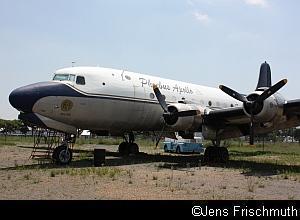 In January
2006, Hennie Delport, owner of Phoebus Apollo, agreed to donated the
recently retired Douglas C-54-15-DC "Helios" (ZS-PAJ) to the South African
Museum Society. One of the stipulations was that the plane remain in the
Phoebus Apollo livery in perpetuity.
In January
2006, Hennie Delport, owner of Phoebus Apollo, agreed to donated the
recently retired Douglas C-54-15-DC "Helios" (ZS-PAJ) to the South African
Museum Society. One of the stipulations was that the plane remain in the
Phoebus Apollo livery in perpetuity.
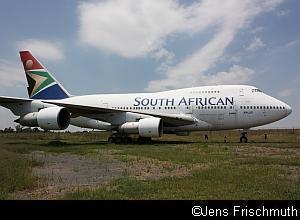 In May 2005, the Museum Society wrote to SAA requesting the
donation of one of two retired Boeing B747-SPs stored at the Denel facilities.
Again, SAA agreed and the Boeing 747 SP-44 "Maluti" (ZS-SPC) would
be the one to be preserved. It would be the first SP to be preserved
by a museum in the world when the plane touched down on runway 11 at Rand
Airport at 7:48 on the 30th of September 2006. Maluti's last commercial flight
was on 24 October 2003, having flown a total of 82313 hours until her last
flight, and she will be left in pristine condition. She will be left
100% intact, unlike Lebombo, which had her engines removed and replaced with
time-expired ones. But even Lebombo's systems are still fully functional and
she could be brought back to airworthiness if required (with the
installation of new engines, inter alia). The SAA Museum Society now had the
distinction of being the only museum in the world with two Boeing 747s in
its possession.
In May 2005, the Museum Society wrote to SAA requesting the
donation of one of two retired Boeing B747-SPs stored at the Denel facilities.
Again, SAA agreed and the Boeing 747 SP-44 "Maluti" (ZS-SPC) would
be the one to be preserved. It would be the first SP to be preserved
by a museum in the world when the plane touched down on runway 11 at Rand
Airport at 7:48 on the 30th of September 2006. Maluti's last commercial flight
was on 24 October 2003, having flown a total of 82313 hours until her last
flight, and she will be left in pristine condition. She will be left
100% intact, unlike Lebombo, which had her engines removed and replaced with
time-expired ones. But even Lebombo's systems are still fully functional and
she could be brought back to airworthiness if required (with the
installation of new engines, inter alia). The SAA Museum Society now had the
distinction of being the only museum in the world with two Boeing 747s in
its possession.
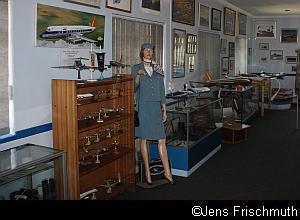 Besides
the static display area that is dominated by the two gigantic Jumbo-jets,
the SAA
Museum Society's facilities at Rand Airport include a display
hall that exhibits historic items such as photographs, aircraft instruments, timetables,
models of planes and uniforms worn by SAA personnel. There is
a gift shop as well and the
Museum is well worth a visit.
Besides
the static display area that is dominated by the two gigantic Jumbo-jets,
the SAA
Museum Society's facilities at Rand Airport include a display
hall that exhibits historic items such as photographs, aircraft instruments, timetables,
models of planes and uniforms worn by SAA personnel. There is
a gift shop as well and the
Museum is well worth a visit.
The South
African Airways Museum Society runs an excellent website. For more
information, go to www.saamuseum.co.za.
Below is a
photographic record of the SAA Museum Society's displays at Rand Airport,
taken in February 2009.
